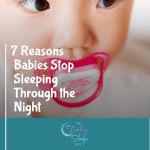Baby night waking is one of the most common issues that bring tired parents to The Baby Sleep Site. But, why exactly do babies wake at night? Why won’t your baby sleep? This article will discuss the 5 primary reasons for baby night waking.
1. Sleep Prop
The official name is “sleep association” but these are more widely known as “sleep props” or “crutches.” This is something your baby “needs” (using that term loosely) in order to sleep. For most babies, in my experience, this will be a pacifier, bottle, or breastfeeding (so a nipple of some sort because sucking is so soothing to them). For many others, this might be movement such as rocking, bouncing, walking, the car, etc. Still fewer, some babies will wake for much less. It might be a hand on their back, just a little reassurance, picking them up for a minute, a snuggle with mom. For high-needs babies, they may need more than one (e.g. bouncing with a pacifier). This varies based on your baby’s temperament.
The bigger the sleep prop, the easier to change, for most babies. Some babies’ sucking reflex is much stronger, though, that can be difficult to change depending on your baby’s age. Sometimes you need to avert their sucking to something besides a pacifier that is harder to find at night, for example. By far, I believe the “small” reasons for waking are much harder to change. Who wants to deny your baby a one-minute hug if he seems to need it, even though it’s exhausting to be woken up EVERY night at 4 a.m.? It becomes an issue of attempting to teach them that there is a right and wrong time for certain things such as 2 p.m. IS an appropriate time to play peek-a-boo, but 2 a.m.? Not so much. It is probably your fault your baby won’t sleep and that’s okay!
2. Developmental Milestones
When your baby is learning how to roll, crawl, pull up, cruise, walk, talk, etc. this can disrupt their night sleep (and your baby’s naps, too!). This might not be too surprising to you since you know all too well when you have a lot on your mind, you might have trouble sleeping, too. This is particularly true during the 8, 9, or 10 month old sleep regression.
One key here is to keep your expectations in check because even when it doesn’t seem like your baby is learning something new doesn’t mean he isn’t. There is a lot to learn and you will be amazed at just how much they change in a short amount of time. When your baby can learn how to go back to sleep on his own, this night waking can be a lot less disruptive for everyone. It doesn’t mean it will necessarily be perfect, but you hearing him wake once a night is a lot different than five times! Even better when he can go back to sleep on his own without a tear or your input whatsoever. Just because a baby wakes at night doesn’t mean he needs to “need” something.
3. Teething
Gah! Teething. It feels like babies teethe for what feels like a constant two years! Many people will throw in that they can teethe for a long time before a tooth even pops through, too. This makes you feel powerless because you have to constantly wonder if teeth are trying to pop through or not. Is he in pain? Is this why my baby is waking all night? Then there is the “other” side who say teething does not disrupt sleep at all. Yeah…right. Because all babies are the same, right? I can tell you there are plenty of babies who are great sleepers but wake for a week (or so) due to teething and then go back to sleeping well, so I know teething does affect some babies.
Having a “teething plan” is of utmost importance. I tried to be sensitive to my sons during teething, but also had to keep sleep at the top of priorities for everyone’s sakes. My second son had a much rougher time with teething than his older brother (who inspired this site) who had more sleep problems, ironically! Finding a healthy balance of helping them through teething without creating a bunch of sleep props is the key to getting through the two years (or more) of teething. I think part of what got me through was what toddlers can teach you about sleep training.
4.Hunger
This one might seem obvious, but there are some people who are surprised when a 5-month-old breastfed baby is still waking at night for a feeding or two, especially if their doctor has told them their baby should not need to eat at night. Keep in mind that to go all night without eating means going 12-13 hours without a feeding, since babies need a lot of sleep. Make sure you read about night feedings and when to night wean.
5. Being Human
This one seems to surprise people. A lot of new parents seem to be confused as to why their baby does not sleep the same every day. This is just a friendly reminder that our babies are not robots. I, too, wondered why my baby woke up at a different time every day or a different time at night for his feeding or took a different length nap every day. Not only did I wonder, but it drove me crazy!! I look back and wondered why I expected him to be the same every day. Perhaps it was the books I was reading. I honestly don’t know.
There are some babies who you can set a clock by. Then there are those like my son who’s different every. single. day. Without fail! Most of it is his temperament and the fact that not all babies are regular. I look at myself and realize that I am not 100% consistent every day, either. Sometimes I’m starving when I wake up and other days I’m not. Some days I’m ready for lunch by 11 a.m. and other days I wait until 1 p.m. to eat. Why did I expect my baby to be the same every day when I’m not? I’ll never figure that one out. But I can share my wisdom with you… Our babies will have good days and bad days just like we do.
There are many reasons a baby is waking at night (or any person for that matter). The number of reasons increases with toddler sleep too! Too cold, too warm, sick, and so on. The above reasons are the five that seem to come up most frequently in sleep consultations. You may want to read about the ideal temperature for your baby to sleep. Of course, when your baby is miserable due to illness, make sure that you comfort and tend to them so they can get better. As with any temporary sleep disruption, though, try to limit things that can become long-term habits.









